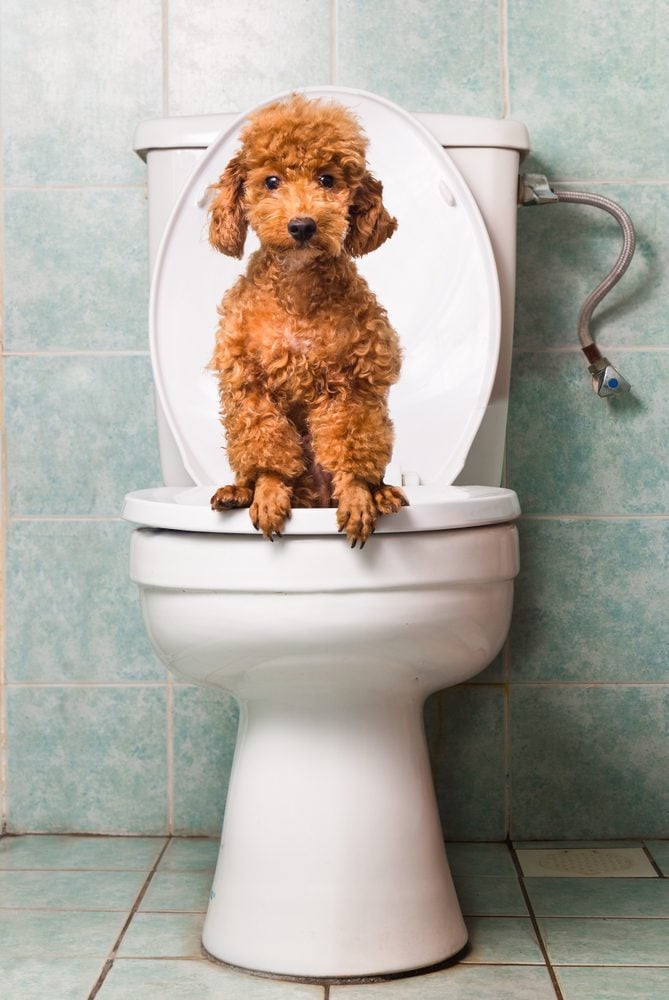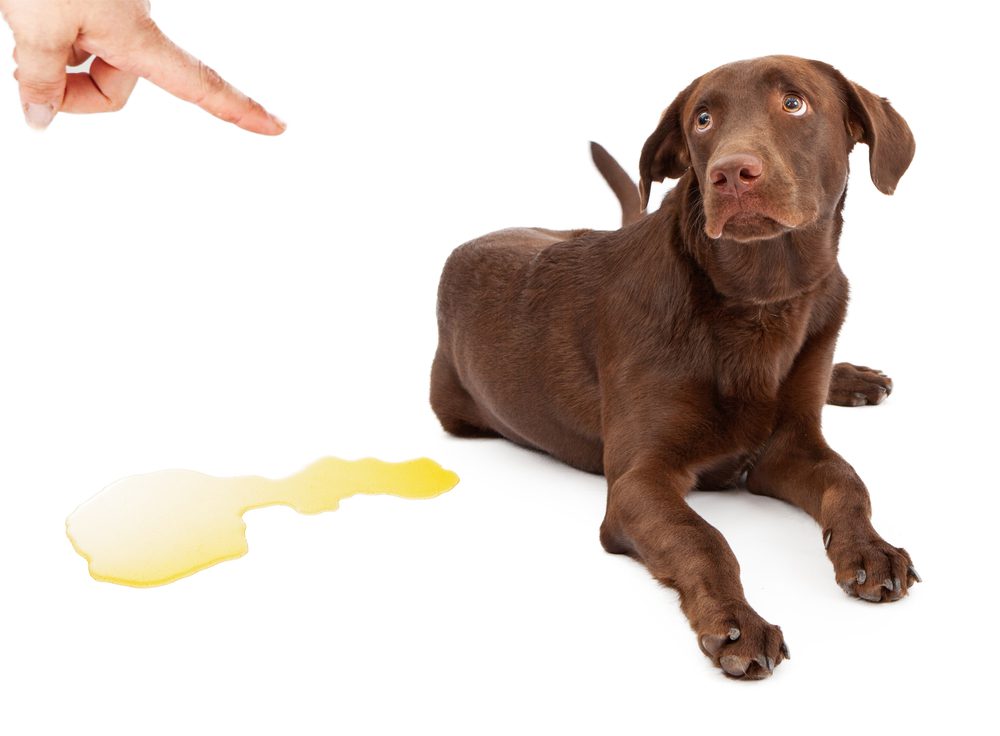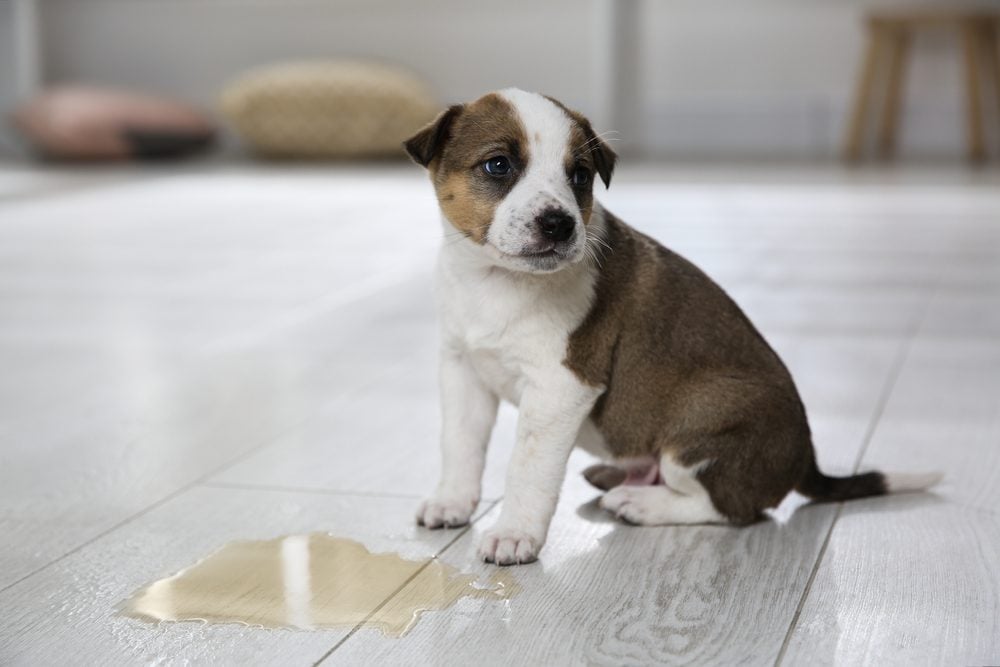Sometimes, it feels like no matter what you do, your puppy still pees in the house. There may even be times when you take your dog outside to piddle and she does nothing, only to pee shortly after getting back in the house.
If you’re struggling with your pup’s house training, you’re not alone. Many owners run into bumps in the road while working on house training. It’s also important to remember that dogs are individuals; you may have had a dog in the past that potty trained way faster than your current dog.
In this article, we’ll discuss why your dog is having accidents as well as the steps you can take to prevent them. It may take some time and a lot of dedication on your part, but your puppy can definitely become fully housebroken.
Why Does My Puppy Keep Peeing in the House?
Understanding why your puppy is peeing in the house can help you approach the situation more constructively. There are a couple of potential reasons that your puppy may be having accidents.
Tiny Puppy = Tiny Bladder
Consider your puppy’s age. The younger your puppy, the smaller their bladder and the less control they have over it. The general rule of thumb is that puppies can hold their bladders for about an hour per month of age. So, a four-month-old pup can be expected to hold it for no more than four hours.
However, dogs are individuals and some may be better at this than others. Furthermore, an eight-week-old puppy may be two months old, but they typically can’t hold it for more than an hour. We’ve even seen eight-week-old puppies who had to pee every 30 minutes!
This is all to say that it is completely natural for puppies to have accidents. They’re still growing and so are their bladders! It’s also common for puppies to have accidents even after being outside. They either weren’t completely finished and needed more time or are still learning what’s acceptable and what isn’t.
Urinary Tract Infections
Although most puppies have accidents simply because they are puppies, sometimes there can be a medical reason. One of the most common medical issues that cause potty accidents is Urinary Tract Infections (UTI).
A UTI happens when bacteria get into the dog’s bladder and reproduce. This bacteria can sometimes cause bladder stones, as well. Signs of a UTI include frequent urination, discomfort or pain while urinating, blood in the urine, dripping urine, and frequent licking of the genitals. Urine may also have a strong odor.
How to Prevent Potty Accidents



Now that you understand how normal it is for puppies to have accidents due to their small bladders, let’s talk about what you can do to prevent accidents in the house.
Use the Right Cleaner
First of all, it’s of the utmost importance that you use the right type of cleaner to clean up your dog’s mess. You need to use an enzymatic cleaner like Nature’s Miracle. This is because even if you use a non-enzymatic cleaner and you cannot see or smell the pee anymore, your dog can.
This lingering scent may encourage your dog to go to the bathroom in the same place. Therefore, you need to use enzymatic cleaners that can truly break down the odor so that your dog no longer smells it.
Predict When Your Dog Has to Go
Though your puppy may surprise you when she unexpectedly squats in the house, you should be able to predict her needs at least some of the time. You can expect all puppies will have to go potty right after they wake up (both from naps and overnight), after they eat or drink, and after playing.
Any type of excitement could cause your puppy to need to pee; even meeting one of your friends or family members will lead to a potty break. Aside from these very predictable potty needs, your puppy may give you some other signals. Sniffing, circling, or hunching of the back are all signs that your puppy is ripe to do her business.
Watch Your Puppy Like a Hawk
Don’t give your puppy too much freedom, even if she seems to be doing well with her housetraining. It’s not uncommon to experience an accident-free week only to have those accidents “come back” (this is a sign your pup isn’t fully housebroken yet).
It’s great if your dog is having minimal accidents in the house, but don’t let it give you a false sense of security. If you give your puppy more freedom or don’t pay as much attention to her, you may miss the signs that she has to go potty and end up with another accident.
You should always keep your puppy in the same room as you. Some owners find that tethering their pups to them with a leash is one of the best ways to work on potty training. If you’re watching your puppy, you’ll either be able to notice the signs when she’s about to go or interrupt her while she’s in the act.
Interruptions should not be scary for your dog; rather, they should redirect your dog to the outdoors. Most people simply pick their pups up in the middle of the act and rush them outside. This is totally fine as long as it’s done calmly.
Establish a Schedule
Having a schedule tends to help us be more productive and waste less time. Though puppies don’t have any work to do, being on a schedule is just as beneficial to them because dogs are routine-oriented animals. Your puppy should have a routine for her feeding and potty breaks.
Routines make certain aspects of the day predictable for your dog. As your dog begins to learn that pottying should happen outside, having a routine will let her know when she can expect to relieve herself. Obviously, your dog’s schedule should coincide with your own.
Of course, the younger the puppy, the more you’ll have to let her out, and you should always let your dog out to potty when she asks for it. However, a routine is still helpful because once your dog gets older and needs less management, her potty breaks and meals will fit seamlessly into your own schedule.
Reward Your Dog for Pottying Outside
Whenever your dog empties her bladder, it’s a rewarding experience. We all understand that feeling of relief. However, you should make the experience more rewarding for your dog outdoors than indoors.
You can easily do this with treats or play. If your dog is food-motivated, then give her a treat every time she goes potty outside. If she’s more motivated by play, throw a toy for her or play tug after she finishes her business.
Whichever reward you choose, don’t give it mid-piddle. Distracting your dog with a reward before she has finished relieving herself could lead to her finishing the job after you get back indoors.
Withhold Water Before Bed
If you find that your puppy is having accidents overnight, know that this is normal. Some puppies will even “wet the bed” while they’re asleep. You can help reduce these types of accidents by withholding water about two hours before bedtime. Of course, you should also take your pup to go potty right before bed.
Crate Training
Crate training your dog can help them with their potty training, and it’s also very useful to have a dog who is comfortable in a crate. Dogs do not like to urinate or defecate in places where they sleep, which is why crate training can help your pup learn how to hold it.
However, crate training only works if the crate is appropriately sized. Your dog should be able to stand up and turn around in the crate comfortably. If your dog can’t stand, the crate is too small.
What’s even more important, though, is that the crate is not too big. Block the crate off at the point where your dog can comfortably turn around while standing. If you don’t, your pup may sleep at one end and potty at the other.
While crate training can be a great help to potty training, it is also a bit of a process. Some dogs will take to the crate right away, whereas others need some help learning to love it. You cannot just put your dog in the crate, close the door, and walk away or she may create negative associations with the crate or even fear being put in it.
We explain the crate training process in more detail, but for now, just know that you need to go slow and crate train your pup step by step. Introduce the crate, use treats to get her to run in (but leave the door open), and slowly continue working toward closing and locking your pup in the crate.
Don’t Punish!



Finally, we must stress how important it is that you don’t punish your dog for having accidents in the house. There is an old belief that pushing or rubbing your dog’s face in their accident is going to make them less likely to relieve themselves in the house in the future.
This is absolutely not true. All this does is weaken the bond between you and your dog and can even cause your dog to fear you. Not only that, but punishing your dog for peeing in the house can exacerbate the problem.
Rather than understanding that they’re being punished for peeing in the house, the dog may instead come to learn that peeing in front of you is unacceptable. This means they may sneak off to piddle out of your sight, making it harder for you to prevent accidents. They may also be afraid to pee in front of you outside, making housebreaking a lot more difficult.
Instead of punishing your dog, follow the advice we’ve given you about watching your pup closely, rewarding her for peeing outdoors, and preventing accidents before they happen. These actions will serve you far better than punishment.
How Long Does Potty Training Take?
Depending on how old your puppy is, you may feel like she should already be potty-trained, or that she should be making more progress than she is. To help you understand whether or not these thoughts are unfounded, we’re going to discuss how long potty training should take.
First of all, we’d like to remind you that your dog is an individual. Just like people, dogs learn at different rates. That said, most dogs can be fully housebroken within four to six months, but there are some that may take up to a year before they stop having accidents in the house.
Four to six months may feel like a long time for a dog to learn to pee outside. What you have to understand is that, while puppies may begin to have control over the bladder at an earlier age, the bladder is not fully formed until about four to six months of age, so they can only hold it for so long.
If you make the effort to make pottying outside a rewarding experience and give your dog ample opportunities to do so, then your puppy is more likely to be completely housebroken once her bladder is fully developed. In the meantime, she’ll have fewer accidents as she begins to understand that she should be pottying in the yard.
Be Proactive With Potty Training
Potty-training your puppy can feel a little frustrating at times, especially when it seems like you’re constantly cleaning up accidents in the house. However, it’s important to understand that puppies have small bladders that they don’t immediately have control of.
Not only that, it takes time for them to understand where they should be eliminating. It’s important that you stay calm and not punish your puppy for having accidents; otherwise, you could make things worse.
Instead, be proactive. Always take your puppy out after naps, meals, playtime, or any other type of excitement. Supervise your pup at all times so you can be ready to take her out when she signals her need or to interrupt her if she catches you by surprise. Most importantly, reward her after she has done her business outside.
If you do your best to prevent accidents and provide your puppy with ample opportunities to relieve herself, she will eventually be completely housebroken. Just remember that this process takes most pups four to six months, so don’t expect your dog to be perfectly housetrained in a week.
